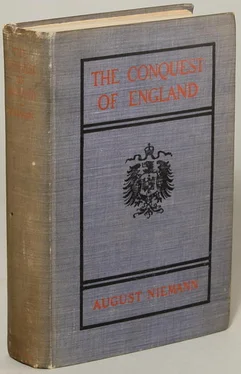August Niemann
THE COMING CONQUEST OF ENGLAND
Translated by J. H. Freese
I recall to mind a British colonel, who said to me in Calcutta: “This is the third time that I have been sent to India. Twenty-five years ago, as lieutenant, and then the Russians were some fifteen hundred miles from the Indian frontier; then, six years since, as captain, and the Russians were then only five hundred miles away. A year ago I came here as lieutenant-colonel, and the Russians are right up to the passes leading to India.”
The map of the world unfolds itself before me. All seas are ploughed by the keels of English vessels, all coasts dotted with the coaling stations and fortresses of the British world-power. In England is vested the dominion of the globe, and England will retain it; she cannot permit the Russian monster to drink life and mobility from the sea.
“Without England’s permission no shot can be fired on the ocean,” once said William Pitt, England’s greatest statesman. For many, many years England has increased her lead, owing to dissensions among the continental Powers. Almost all wars have, for centuries past, been waged in the interests of England, and almost all have been incited by England. Only when Bismarck’s genius presided over Germany did the German Michael become conscious of his own strength, and wage his own wars.
Are things to come to this pass, that Germany is to crave of England’s bounty—her air and light, and her very daily bread? or does their ancient vigour no longer animate Michael’s arms?
Shall the three Powers who, after Japan’s victory over China, joined hands in the treaty of Shimonoseki, in order to thwart England’s aims, shall they—Germany, France, and Russia—still fold their hands, or shall they not rather mutually join them in a common cause?
In my mind’s eye I see the armies and the fleets of Germany, France, and Russia moving together against the common enemy, who with his polypus arms enfolds the globe. The iron onslaught of the three allied Powers will free the whole of Europe from England’s tight embrace. The great war lies in the lap of the future.
The story that I shall portray in the following pages is not a chapter of the world’s past history; it is the picture as it clearly developed itself to my mind’s eye, on the publication of the first despatch of the Viceroy Alexieff to the Tsar of Russia. And, simultaneously like a flash of lightning, the telegram which the Emperor William sent to the Boers after Jameson’s Raid crosses my memory—that telegram which aroused in the heart of the German nation such an abiding echo. I gaze into the picture, and am mindful of the duties and aims of our German nation. My dreams, the dreams of a German, show me the war that is to be, and the victory of the three great allied nations. Germany, France, and Russia—and a new division of the possessions of the earth as the final aim and object of this gigantic universal war.
THE AUTHOR.
This volume is the authorised translation of Der Weltkrieg deutsche Traume (F. W. Vobach and Co., Leipsic). The translator offers no comment on the day-dream which he reproduces in the English language for English readers. The meaning and the moral should be obvious and valuable.
LONDON, September, 1904.
It was a brilliant assemblage of high dignitaries and military officers that had gathered in the Imperial Winter Palace at St. Petersburg. Of the influential personages, who, by reason of their official position or their personal relations to the ruling house, were summoned to advise and determine the destiny of the Tsar’s Empire, scarcely one was absent. But it was no festal occasion that had called them here; for all faces wore an expression of deep seriousness, amounting in certain cases to one of grave anxiety. The conversation, carried on in undertones, was of matters of the gravest import.
The broad folding-doors facing the lifesize portrait of the reigning Tsar were thrown wide open, and amid the breathless silence of all assembled, the grey-headed President of the Imperial Council, Grand Duke Michael, entered the hall. Two other members of the Imperial house, the Grand Dukes Vladimir Alexandrovitch and Alexis Alexandrovitch, brothers of the late Tsar, accompanied him.
The princes graciously acknowledged the deep obeisances of all present. At a sign from the Grand Duke Michael, the whole company took their places at the long conference table, covered with green cloth, which stood in the centre of the pillared hall. Deep, respectful silence still continued, until, at a sign from the President, State Secretary Witte, the chief of the ministerial council, turned to the Grand Dukes and began thus:—
“Your Imperial Highnesses and Gentlemen! Your Imperial Highness has summoned us to an urgent meeting, and has commissioned me to lay before you the reasons for, and the purpose of, our deliberations. We are all aware that His Majesty the Emperor, our gracious Lord and Master, has declared the preservation of the peace of the world to be the highest aim of his policy. The Christian idea that mankind should be ‘ONE fold under ONE shepherd’ has, in the person of our illustrious ruler, found its first and principal representative here on earth. The league of universal peace is solely due to His Majesty, and if we are called upon to present to our gracious Lord and Master our humble proposals for combating the danger which immediately menaces our country, all our deliberations should be inspired by that spirit which animates the Christian law of brotherly love.”
Grand Duke Michael raised his hand in interruption. “Alexander Nicolaievitch,” he said, turning to the Secretary, “do not omit to write down this last sentence WORD FOR WORD.”
The Secretary of State made a short pause, only to continue with a somewhat louder voice and in a more emphatic tone—
“No especial assurance is required that, in view of this, our noble liege lord’s exalted frame of mind, a breach of the world’s peace could not possibly come from our side. But our national honour is a sacred possession, which we can never permit others to assail, and the attack which Japan has made upon us in the Far East forced us to defend it sword in hand. There is not a single right-minded man in the whole world who could level a reproach at us for this war, which has been forced upon us. But in our present danger a law of self-preservation impels us to inquire whether Japan is, after all, the only and the real enemy against whom we have to defend ourselves; and there are substantial reasons for believing that this question should be answered in the negative. His Majesty’s Government is convinced that we are indebted for this attack on the part of Japan solely to the constant enmity of England, who never ceases her secret machinations against us. It has been England’s eternal policy to damage us for her own aggrandisement. All our endeavours to promote the welfare of this Empire and make the peoples happy have ever met with resistance on the part of England. From the China Seas, throughout all Asia to the Baltic, England has ever thrown obstacles in our way, in order to deprive us of the fruits of our civilising policy. No one of us doubts for a moment that Japan is, in reality, doing England’s work. Moreover, in every part of the globe where our interests are at stake, we encounter either the open or covert hostility of England. The complications in the Balkans and in Turkey, which England has incited and fostered by the most despicable methods, have simply the one object in view—to bring us into mortal conflict with Austria and Germany. Yet nowhere are Great Britain’s real aims clearer seen than in Central Asia.
Читать дальше












